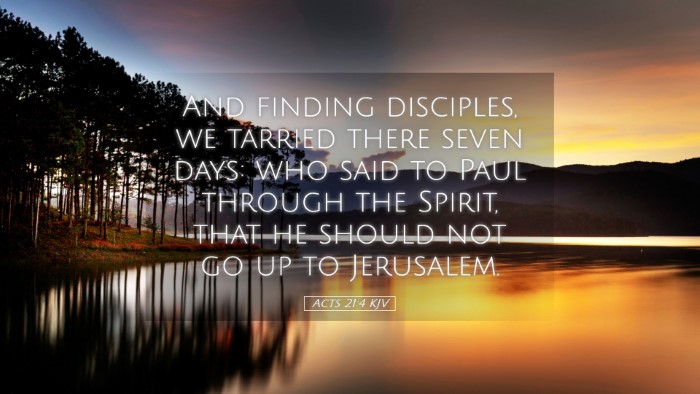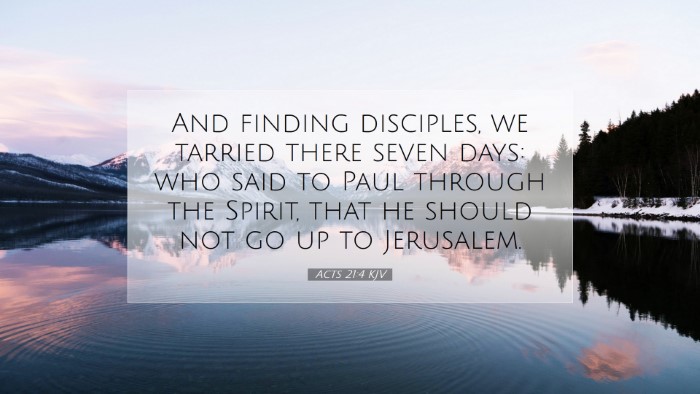Acts 21:4 Commentary
Bible Verse: "And finding disciples, we stayed there seven days: who said to Paul through the Spirit that he should not go up to Jerusalem."
Contextual Background
The passage in Acts 21:4 takes place during the latter part of Paul's missionary journey as he approaches Jerusalem. This is crucial in understanding the complexities of Paul's mission and the prophetic warnings he received. The narrative indicates the fervent commitment of the early disciples and the spiritual insight they possessed.
Commentary Analysis
This verse is rich in theological implications and presents several key points that warrant further exploration:
- Finding Disciples: The mention of "finding disciples" highlights the presence and importance of the early Christian community. This indicates that even amidst Paul’s travels, he was deeply connected to the local believers and their role in the burgeoning church.
- The Duration of Stay: The seven-day stay symbolizes a period of fellowship and mutual edification among believers. This emphasizes the importance of community in the faith journey, as Paul receives guidance and encouragement.
- Through the Spirit: The phrase "who said to Paul through the Spirit" introduces the concept of divine revelation. It reflects the belief that the Holy Spirit guides and warns believers, which is a recurring theme in the Acts of the Apostles.
- Warning Against Jerusalem: The warnings provided to Paul about going to Jerusalem serve as a pivotal moment in the narrative. This establishes a tension between human caution rooted in concerns for Paul’s safety and his unwavering commitment to the mission.
Insights from Public Domain Commentaries
Matthew Henry's Commentary
Matthew Henry emphasizes the role of the Holy Spirit in guiding and warning believers. He remarks on the concern shown by the disciples for Paul's safety, reflecting on their strong bond and collective spirit. Henry points out that this foresight was not meant to deter Paul from his mission but to show the intensity of the challenges he would face.
Albert Barnes' Commentary
Albert Barnes provides insight into the nature of the disciples’ prophecy. He interprets their message as a divine warning rooted in knowledge of the impending sufferings awaiting Paul in Jerusalem. Barnes notes that their advice was likely based on spiritual discernment, allowing them to sense the forthcoming tribulations. However, Barnes affirms that Paul, equipped with a sense of divine calling, ultimately remained steadfast in his decision to proceed despite the warnings.
Adam Clarke's Commentary
Adam Clarke offers a detailed analysis of the cultural and historical background of the early church, noting that these warnings reflect a genuine concern for Paul’s well-being. Clarke elaborates on the importance of the spiritual community and the necessity for prayerful consideration in the decision-making processes within the church. He suggests that these prophetic words were not solely warnings but also served to prepare Paul for the trials that lay ahead.
Theological Implications
The discourse around Acts 21:4 raises several theological inquiries worthy of consideration:
- Revelation and Guidance: How does the Holy Spirit communicate guidance today? The role of prophecy and discernment remains critical in contemporary theology.
- Community and Accountability: The importance of community in a believer's life resonates throughout this passage. It invites reflection on how communities can support and challenge their members.
- Courage in Calling: Paul’s readiness to heed the calling despite warnings provokes a discussion on the nature of divine calling and the cost of discipleship. This can encourage theological discourse about modern faith challenges.
Practical Applications
For pastors, students, and theologians, this verse provides several practical applications:
- Encouragement in Fellowship: Emphasize the need for Christian community in spiritual discernment and mutual support in ministry.
- Understanding God’s Call: Encourage reflection on one’s personal call to ministry, reinforcing that obedience to God’s prompting may come with significant challenges.
- Discernment and Prophetic Voices: Foster an environment where prophetic voices can be heard and understood within the context of church community and leadership.
Conclusion
Acts 21:4 encapsulates a moment of tension and divine communication that is foundational in understanding Paul’s journey. The insights derived from the commentaries of Henry, Barnes, and Clarke illuminate the multifaceted nature of prophecy, community, and mission in the early church. As we engage with this verse, we are reminded of the importance of heeding the Spirit's guidance while remaining committed to the task set before us.


